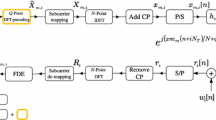Abstract
The Orthogonal Frequency Division Multiplexing (OFDM) transmission technique can efficiently deal with multi-path propagation effects especially in broadband radio channels. It also has a high degree of system flexibility in multiple access schemes by combining the conventional TDMA, FDMA and CDMA approaches with the OFDM modulation procedure which is particularly important in the uplink of a multi-user system. In OFDM-FDMA schemes carrier synchronization and the resulting subcarrier orthogonality plays an important role to avoid any multiple access interferences (MAI) in the base station receiver. An additional technical challenge in system design is the required amplifier linearity to avoid any non-linear effects caused by a large peak-to-average ratio (PAR) of an OFDM transmission signal. A specific OFDM-FDMA uplink procedure is proposed and will be designed in this paper which can be seen as a combination of a specific subcarrier spreading scheme and subcarrier selection process. The resulting transmit signal consists of a periodic extension and multiple repetition of all modulation symbols and leads therefore to an extremely low computation complexity in the transmitter. Furthermore, the transmit signal shows simultaneously a constant envelope to avoid any non-linear effects in the amplification process. This uplink scheme can be considered as a trade off between low computation complexity and system performance.
Similar content being viewed by others
References
1 J.A. Bingham, “Multicarrier Modulation for Data Transmission: An Idea Whose Time has Come”, IEEE Communications Magazine, 1990.
2 H. Rohling, D. Galda, and E. Schulz, “An OFDM Based Cellular Single Frequency Communication Network”, in Proc. of the Wireless World Research Forum'04, Beijing, China, 2004.
3 K. Brüninghaus and H. Rohling, “On the Duality of Multi-Carrier Spread Spectrum and Single-Carrier Transmission”, in Zweites OFDM-Fachgespräch, Braunschweig, Germany, 1997.
4 K. Brüninghaus and H. Rohling, “Multi-Carrier Spread Spectrum and its Relationship to Single Carrier Transmission”, in Proc. of the IEEE VTC'98, Ottawa, Canada, 1998.
5 M. Shen, G. Li, and H. Liu, “Design Tradeoffs in OFDMA Uplink Traffic Channels”, in IEEE Trans. on Wireless Communications, 2004.
6 J. Gross, H. Karl, F. Fitzek, and A. Wolisz, “Comparison of Heuristic and Optimal Subcarrier Assignment Algorithms”, in Proc. of Intl. Conf. On Wireless Networks (ICWN), Las Vegas, Nevada, USA, 2003.
7 I. Toufik and R. Knopp, “Channel Allocation Algorithms for Multi-Carrier Systems“, in Proc. of the IEEE VTC '04, Los Angeles, California, USA, 2004.
8 S. Kaiser, “OFDM Code-Division Multiplexing in Fading Channels”, in IEEE Trans. on Communications, vol. 50, pp. 1266–1273, Aug. 2002.
9 J.P. Linnartz, “Synchronous MC-CDMA in Dispersive, Mobile Rayleigh Channels”, in Proc. of IEEE SPS-2000, Hilvarenbeek, The Netherlands, 2000.
10 Y.P. Lin and S.M. Phoong, “BER Minimized OFDM Systems with Channel Independent Precoders” in IEEE Trans. on Signal Proc., vol. 51, pp. 2369–2380, Sept. 2003.
11 A. Jones and T. Wilkinson, “Combined Coding for Error Control and Increased Robustness to System Nonlinearities on OFDM”, in Proc. of IEEE VTC '96, Atlanta, USA, 1996.
12 T. May and H. Rohling, “Reducing the Peak-to-Average Power Ratio in OFDM Radio Transmission Systems”, in Proc. of the IEEE VTC, Ottawa, Canada, 1998.
13 M. Pauli and H.-P. Kuchenbecker, “Reduzierung der Durch Nicht-Linearitäten Hervorgerufenen Ausserbandstrahlung bei Einem Mehr-trägerverfahren”, ITG Fachberichte 135, Mobile Kommunikation 1995. (In German).
14 M. Breiling, S.H. Müller-Weinfurtner, and J.B. Huber, “Peak-Power Reduction in OFDM Without Explicit Side Information”, in Proc. of the 5th Int. OFDM Workshop (InOWo'00), Hamburg, Germany, 2000.
Author information
Authors and Affiliations
Corresponding author
Additional information
Prof. Hermann Rohling is with the Technical University Hamburg-Harburg, Germany where he has developed an international reputation in the field of OFDM transmission techniques. Previously Prof. Rohling was with the AEG Research Institute, Ulm as a researcher working in the area of digital signal processing for radar and communications applications. His research interests have included Wideband Mobile Communications especially based on Multicarrier Transmission Techniques (OFDM) for future broadband systems (4G), signal theory, digital radar signal processing, detection, estimation and differential GPS for high precision navigation. Prof. Rohling is a member of Informationstechnische Gesellschaft (ITG), German Institute of Navigation (DGON) and a senior member of IEEE. He is chairman of the August 2005 International OFDM Workshop (InOWo 2005) in Hamburg, Germany.
Martin Stemick received the Dipl.-Ing. degree in electrical engineering from the Technical University Hamburg Harburg (TUHH), Germany in 2004. Currently, he is a Ph. D. student and belongs to the scientific staff of the Department of Telecommunications, TUHH, Hamburg, Germany. His research interests include wireless OFDM-systems, with a current emphasis on resource allocation and equalization techniques.
Rights and permissions
About this article
Cite this article
Stemick, M., Rohling, H. OFDM-FDMA Scheme for the Uplink of a Mobile Communication System. Wireless Pers Commun 40, 157–170 (2007). https://doi.org/10.1007/s11277-006-9106-x
Received:
Accepted:
Published:
Issue Date:
DOI: https://doi.org/10.1007/s11277-006-9106-x




